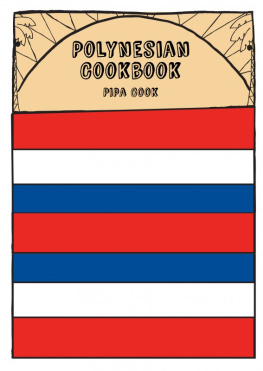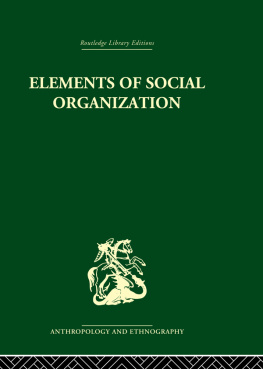Routledge Library Editions
PRIMITIVE POLYNESIAN ECONOMY
ANTHROPOLOGY AND ETHNOGRAPHY
Routledge Library Editions
Anthropology and Ethnography
RAYMOND FIRTH: COLLECTED WORKS
In 6 Volumes
I | Capital, Saving and Credit in Peasant Societies |
Firth & Yamey |
II | Elements of Social Organization | Firth |
III | Primitive Polynesian Economy | Firth |
IV | Social Change in Tikopia | Firth |
V | Themes in Economic Anthropology | Firth |
VI | We, the Tikopia | Firth |
PRIMITIVE POLYNESIAN ECONOMY
RAYMOND FIRTH
First published in 1939
Reprinted in 2004 by
Routledge
2 Park Square, Milton Park, Abingdon, Oxon, OX14 4RN
Transferred to Digital Printing 2006
Routledge is an imprint of the Taylor & Francis Group
All rights reserved. No part of this book may be reprinted or reproduced or utilized in any form or by any electronic, mechanical, or other means, now known or hereafter invented, including photocopying and recording, or in any information storage or retrieval system, without permission in writing from the publishers.
The publishers have made every effort to contact authors/copyright holders of the works reprinted in Routledge Library Editions Anthropology and Ethnography. This has not been possible in every case, however, and we would welcome correspondence from those individuals/companies we have been unable to trace.
These reprints are taken from original copies of each book. In many cases the condition of these originals is not perfect. The publisher has gone to great lengths to ensure the quality of these reprints, but wishes to point out that certain characteristics of the original copies will, of necessity, be apparent in reprints thereof.
British Library Cataloguing in Publication Data
A CIP catalogue record for this book is available from the British Library
Primitive Polynesian Economy
ISBN 978-0-415-33017-6
Miniset: Raymond Firth: Collected Works
Series: Routledge Library Editions Anthropology and Ethnography
PLATE I.
The boy is water-carrier to the two men kneading the sago pith.
PRIMITIVE
POLYNESIAN ECONOMY
BY
RAYMOND FIRTH
Reader in Anthropology in the University of London
Illustrated
LONDON
GEORGE ROUTLEDGE & SONS, LTD.
BROADWAY HOUSE : 6874 CARTER LANE, E.C.
First published in 1939
LIST OF PLATES
I. The Manufacture of Sago Flour
T HIS book is in a sense a supplement to my Primitive Economics of the New Zealand Maori. Together they provide a comparative analysis of the institutions of two Polynesian communities differing considerably in natural environment, in population, and in political organization. For the Maori I had to use primarily documentary sources, often fragmentary; my own brief field work trips among them filled few gaps. And since the Maori have for a century been participants in an Antipodean variant of European civilization, my generalizations had to be mainly reconstructions, though some of the traditional principles of organization have shown a sturdy vitality to the present day.1
Tikopia, on the other hand, is a living Polynesian culture, practically autonomous. This has allowed the analysis of contemporary behaviour, based upon my first-hand observation. The present book compared with that on the Maori therefore gives a more dynamic picture of the economic processes.
I am fully conscious that the exploration of economic theory could be carried much farther than it is here, but I hope to have indicated at least some lines along which both field study and theoretical analysis may be pursued.
I wish to acknowledge the help that I have received from Dr. W. E. H. Stanner, Dr. R. Piddington, and Mr. E. R. Leach in the preparation of this book, and I am grateful to the Committee of the Rockefeller Research Fund of the London School of Economics for making their services available to me. I am indebted also to Mr. V. G. J. Sheddick for preparing the map, and to my wife for much valuable criticism. And finally, I wish to express my obligation to the Australian National Research Council, who financed my field-expedition.
October, 1938.
1 This has been demonstrated by Sir Apirana Ngata, Native Land Development (New Zealand Parliamentary Paper, G. 10), 1931, pp. VIIXV. Cf. F. M. Keesing, The Changing Maori (Memoirs of Board of Maori Ethnological Research, vol. iv), 1928.
PRIMITIVE
POLYNESIAN ECONOMY
Primitive Polynesian Economy
CHAPTER I
Problems of Primitive Economics
A T the present day primitive societies all over the world are being subjected to the impact of our Western industrial system. Even in remote communities, in the South Seas or Arctic regions, with a simple standard of living, the technical equipment and forms of production have been changed by the introduction of steel tools, and a new market presented by the establishment of trading relations with Europeans. More accessible peoples, with more complex standards, have had their organization and their scheme of wants radically altered by more intensive European contact. Some manufacturers of Europe and America, and latterly, of Japan, have found in them markets for a variety of their products; others rely on obtaining from them supplies of raw materials such as pearl-shell or vegetable oils; while for plantation work, farming, mining, and a multitude of other objects they are drawn upon for a supply of unskilled or semi-skilled labour. The impact of our economic system upon these peoples has been reinforced by other interestsin territorial acquisition and maintenance of political control, in religious proselytization and in moral and educational elevation. With a view to improving the welfare of these native peoples they are encouraged to grow crops for sale, to practise new technical methods of production, to adopt individual forms of ownership of property, to rely upon modern scientific assistance in agriculture and animal husbandry, to form co-operative organizations for the marketing of their produce. Attempts are made to raise their standard of living, and they are provided with education which gives them still new wants.
The response to this array of forces, with all the novel outlets for energy and ambition that they bring, is diverse, and not all native peoples react in the same way. Moreover, in the same community, different attitudes may be dominant at different periods of time, a stage of enthusiastic attempts to adopt the new standards being succeeded by one of aversion from them, or vice versa, according to particular circumstances.1 But in most communities the people rise to the bait of the more obvious inducements held out to them by the new economic and social system. Their men go to work for the white man, and are eager to spend their wages on clothing, tinned foods, electric torches, tobacco, bicycles and a host of other goods not to mention cinema shows; their women back up this attitude with their demand for bright dress materials, glass bangles, sewing machines, and other household furniture; their children wish to be taught to read and write in order that they may understand more easily the ways of this attractive world that lies beyond their village, and ultimately perhaps make a position for themselves as servants of the Government. The reactions of all this on the traditional native way of life need not be discussed here. They have been a subject of study by anthropologists and others for well over a decade.2







